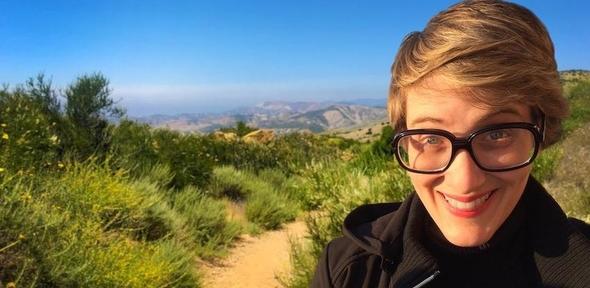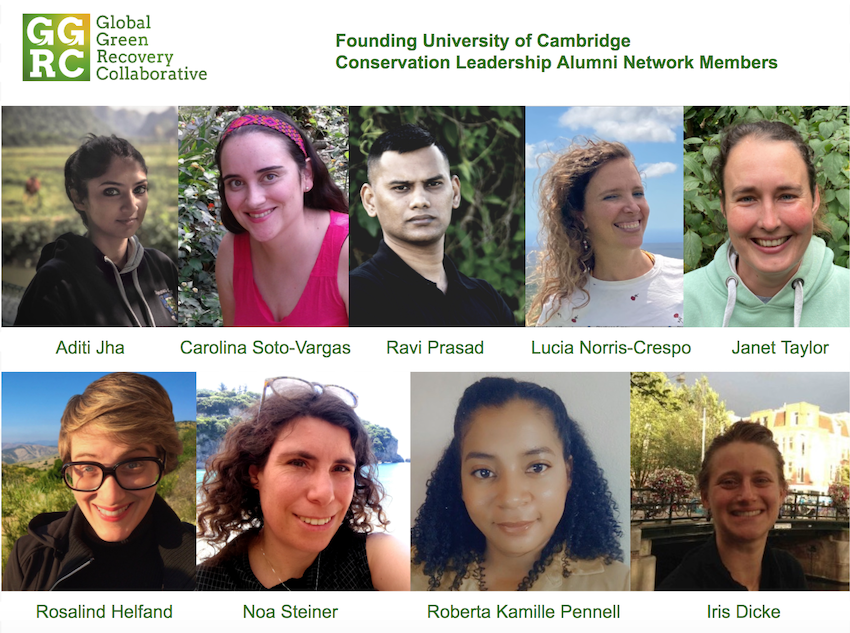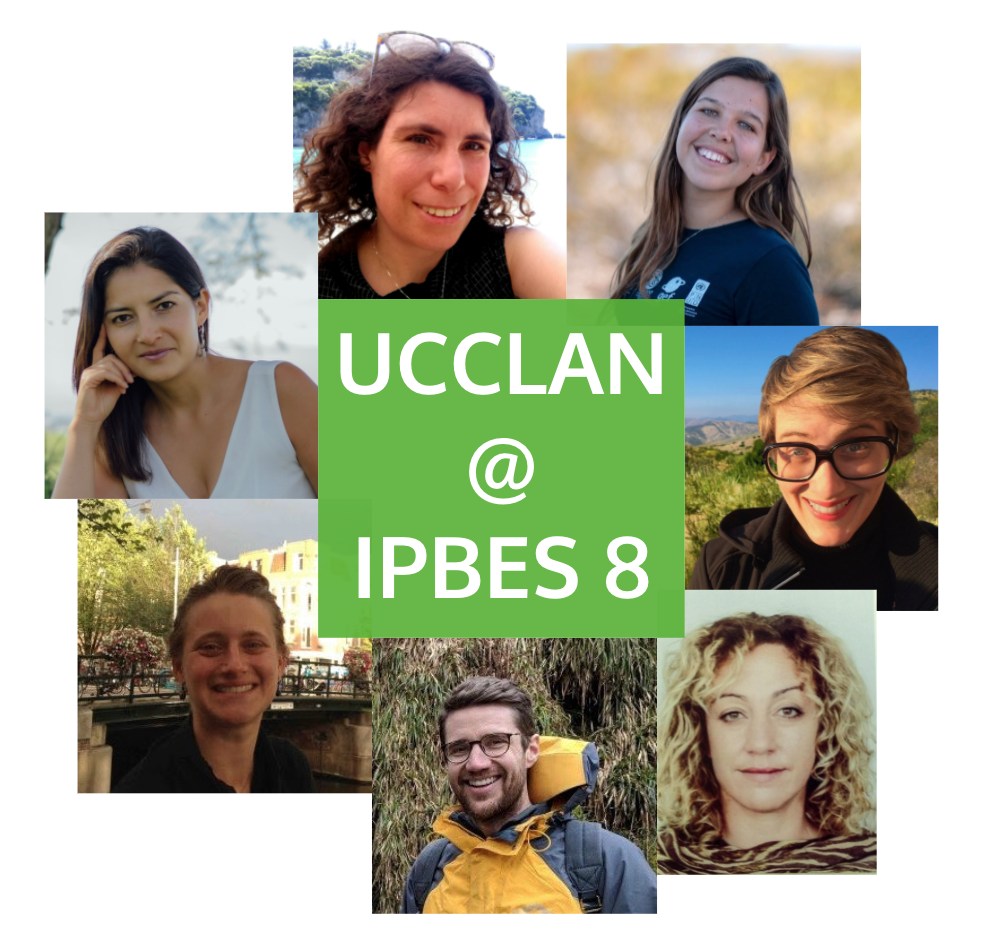
Submitted by S. Bolderson on Thu, 31/03/2022 - 10:51
Rosalind Helfand, from the 2018-19 cohort, is based in Los Angeles, California. Since graduating Rosalind founded PAJE Consulting for environmental and social policy issues, where she is working with non-profits and government at the local, state, and global levels on projects like engaging the state of California with the Convention on Biological Diversity.
Rosalind is an active member of the alumni network (UCCLAN) and one of the first recipients of the Sansom Conservation Leadership (SCLA) Fund. She is excited to be collaborating with fellow UCCLAN members to contribute to global discussions and action for the future of biodiversity.
We caught up with her to find out more about some of the incredible projects and programmes she has been involved with since graduating the Masters in 2019.
Can you tell us about California at the CBD and your involvement with this achievement?
At COP 26, California became the first US state to sign the Edinburgh Declaration in its capacity as an official Convention on Biological Diversity (CBD) subnational government observer. My involvement with this achievement began with my MPhil dissertation (with a long title): “Achieving Transformative Change for the Future of Biodiversity & the Post-2020 Framework for the Convention on Biological Diversity.”
It was clear to me that for the CBD to effectively help solve the global biodiversity crisis, we need progressive leadership from within the US -- which never ratified the treaty. And we need more subnational and local engagement with the CBD. With California’s history of strong environmental policies, its large economy, and its high level of community engagement, it made sense to ask the state to become a CBD observer. I contacted a leading environmental policy maker in the California state legislature, Assemblymember Laura Friedman, and asked her to champion California’s CBD participation. I also reached out directly to the CBD, which put me in touch with representatives in the government of Quebec and an organisation that manages subnational government participation called Regions 4.
Friedman came on board in January 2020 and then in March 2020 I launched and led the successful coalition campaign -- of over 30 non-profits and elected officials -- for California to become an observer, and I continue to lead stakeholder engagement around California's participation in the CBD. These stakeholders are giving input to our state government, building awareness, and connecting the state's local and global biodiversity policy efforts in advance of COP 15 (coming up later in 2022). This has become a team effort with leaders from California Environmental Voters, the California Native Plant Society, Turtle Island Restoration Network, and Assemblymember Friedman’s office joining our core organising group.
California is also uniting its efforts to protect biodiversity with other subnational governments worldwide, and this is an important step towards achieving transformative change for our future. I'm excited to see what started as an idea during my time as a Conservation Leadership student take off and, hopefully, have a real impact.
Further to this, you have been one of the drivers for the UCCLAN’s involvement in the CBD, can you outline what has happened so far and what the future holds for the CBD?
In 2019, I helped kick-off UCCLAN teaming up to work on our first ever global policy contribution. We submitted a position for the CBD’s Global Biodiversity Framework (GBF) Zero Draft, with over 100 members signing on. On the heels of that, a UCCLAN group including many of the CBD position contributors, published “A call for collective crisis leadership” editorial in Oryx. Since then, we’ve attended CBD meetings -- mostly virtually due to the pandemic -- and contributed input to the ongoing GBF discussions. This is powerful because we’re not only contributing to the specifics of new global conservation goals and targets, we’re contributing the collective thought power of UCCLAN to devising stronger approaches for implementing conservation goals and seeking transformative systems change.
Negotiations for Draft One of the GBF, where I was in attendance as a member of the UCCLAN delegation team, just wrapped. Coming up are another set of draft negotiations in Nairobi in June. And then the CBD’s 15th Conference of Parties which will, hopefully, adopt the GBF is coming up later this year. From there, nations will need to incorporate the GBF into their national planning and implement it.
Implementation will be so key. Nations will seek to translate the GBF on the subnational and local levels and it’s likely that many UCCLAN members will be impacted by how this is done. That’s another reason why it’s so important that UCCLAN members engage with this process now -- that we work together to influence the GBF for the best possible outcome, that we continue to grow as thought leaders, that we contribute to the development of the implementation framework, and that we build strong relationships with government representatives, civil society, and local and indigenous community leaders who are also engaged with this process.
A fantastic and growing group of UCCLAN members have and are directly engaging with this work: taking on leadership roles, developing our written positions and editorial, and contributing to our virtual discussions and workshops. We have a strong core team, now, and our Geneva delegation is working collaboratively, and also includes Mariana Martínez de Río de la Torre, Daniel Flenley, Michelle Cooper, Sudha Iyer, Noa Steiner, Iris Dicke, Aylin McNamara, Lebogang Seitshiro, and Lebogang Seitshiro.
You were part of the team that successfully secured funding from the SCLA Fund, can you tell us about your project and the opportunities it brings to the alumni network?
The Global Green Recovery Collaborative (GGRC) project was founded in the midst of Covid-19 to look for collaborative and innovative solutions to this and other global environmental crises. We have such an outstanding, motivated team spanning multiple UCCLAN cohorts and countries including: Iris Dicke/Netherlands, Aditi Jha/India, Lucia Norris/ Ecuador, Kamille Pennell/Belize, Ravi Prasad/Fiji (my co-leader on the project!), Carolina Soto/Colombia, Noa Steiner/Israel, and Janet Taylor/South Africa. We also have a team of website designers and developers in Fiji and Israel, as well as interns in Fiji and the US and a recent addition to our team who’s formerly of the UNDP in Georgia. And, we have a global group of high school students volunteering with us.
We’re creating an adaptable online platform to drive on-the-ground conservation impact by facilitating collaboration, awareness and learning, and inclusive action. Participants can become project members, connect, team up, and work collectively on the design and implementation of green recovery solutions. We plan to launch around late April 2022, and one of our key goals is engaging our UCCLAN network. UCCLAN members will be able to contribute to “initiatives” -- projects and campaigns that will further green recovery objectives -- to feature on our site, as well as blog posts.
We also hope UCCLAN members will become members of our platform and engage with it in order to form collaborations, partnerships, and coalitions, to spark dialogue on our discussion boards, join our roundtable discussions, and help us grow and build awareness of our project. This is an incredible opportunity to achieve many of the goals of our network and explore our full potential.
Though we’re not yet live, we have new social media pages and you can follow us on social media here: Facebook, Twitter, Instagram, LinkedIn
You co-led UCCLAN’s involvement in IPBES 8 last June, can you tell us more about your experiences and what it means for the UCCLAN?
In June 2021, UCCLAN members teamed up to contribute to the 8th Plenary of the Intergovernmental Science-Policy Platform on Biodiversity and Ecosystem Services or IPBES 8. IPBES has an amazing ability to influence how global policy forums, governments, and even the public world over are looking at biodiversity loss. And their communications are strong. Their press outreach from 2019 resulted in loads of people talking about how 1 million plant and animal species face possible extinction, even if relatively few of them are likely to know what IPBES is if you ask them.
Still, it can be frustrating to attend these global policy meetings because you really see all of the barriers to globally coordinated action. But here’s the thing: UCCLAN is in this vital stage of building up our presence, reputation, and recognisability. As we do this, our ability to make a difference for global policy is going to increase. The more visible we are and the more we engage, the greater our opportunities to pinpoint where we can advance better sharing of information, stronger inclusion of local and indigenous peoples, and greater accountability. And, each time we engage, we are also increasing our ability to effectively work together.
Can you tell us more about the future of PAJE Consulting?
PAJE stands for: Policy, Action, Justice, Environment. I want PAJE to drive innovation for environmental solution making, and especially how we visualise and realise transitions. I’m also interested in novel approaches to connecting local and global efforts to address our biodiversity and climate crises: Approaches that are intersectional and inclusive of environmental and social justice movements. I think it’s not just important to build coalitions, but super coalitions. A client recently told me I have “a knack for herding cats.” I plan to use that ability to grow collaboration, advocacy, and action, and make a difference for the issues I want to work on and the organisations I want to work with.
Coming up, I want to transition PAJE from a consultancy to a non-profit consulting think tank. I’m working on the business and funding plan for this, and have already decided to seek a 501(c)(4) tax status for PAJE. In the United States, this status allows a non-profit organisation to engage more in political advocacy. The downside is that donations to PAJE will not be tax-deductible, but I’m confident I’ll be able to identify funders who believe in the work we’re doing and for whom this won’t be an issue.
What is the biggest opportunity about being a part of the UCCLAN?
These days I hear a lot of organisations talking about the importance of diversity, inclusion, and collaboration. Being a part of UCCLAN offers the opportunity to collaborate on a scale and in ways others dream of -- and to truly realise those ideals of diversity and inclusion. We have this incredible network of leaders with an extraordinary range of experience. And we each have our own impressive networks. Tapping into these, UCCLAN can become the most effective group for generating advocacy, original thinking, and new or improved approaches to solving global and local environmental problems for real impact. We just need to each fully embrace this potential and contribute to UCCLAN’s success, while unabashedly seeking the resources, support, and capacity building we need to succeed.
I also think we can’t underestimate the importance of the personal with UCCLAN. We all need a lot of moral and motivational support in the work we do. Continuing to connect and talk with our fellow UCCLAN members -- our global network of fellow professionals -- is incredibly revitalising and can help keep us all going.
What do you think the priorities should be for those leading in conservation?
We can be pragmatists and / or localists and unafraid to go big at the same time. While there continues to be a need for scientific neutrality and area specific conservation projects, when we can safely do so, we need to also call for systemic change, call out conflicts of interest with corporations and government, and ensure that policy solutions addressing social and climate change problems are grounded in protecting and restoring biodiversity. I recently spoke with the head of a startup company who’s working on carbon capture technology. She hadn’t considered the importance of ensuring that her solution will not have a negative consequence for biodiversity. Those leading conservation should be reaching out to have these conversations.
We must also prioritise equity and not fail to address the intersection of poverty, conflict, racism, and human rights abuses and our work -- whether we’re directly impacted or others are impacted. Not just seeking to empower indigenous and local communities but creating avenues for them to become leaders, equal partners, and innovators -- with the support they need to succeed -- is key. And we need to help others make the connection between healthy communities and healthy biodiversity.
In terms of more specific priorities, I may sound like a broken record, but I want to emphasize that we should continue to invest heavily in building collaborations and coalitions. We need to drive the kinds of impacts that are harder to measure quantitatively and take years to build, but will lay foundations for deeper long term change. We also need to collaborate strongly with social scientists and with groups that represent workers. Conservation in the urban environment is becoming more and more critical and shouldn’t be an isolated discussion -- we need to integrate urban conservation and greening into our work. This includes opportunities to rethink agriculture and redesigning urban spaces for localised food production -- and hopefully open space for restoration. And, we need to pay more attention to high seas and deep sea conservation. Finally, I think it’s important to push back at any tendency to look at the rights of nature and of individual species to thrive as purely a matter of individual morals or preferences. This topic is part of a critical shift in our relationship with our planet that needs serious investment.
Any other highlights I have missed?
I’m excited to be collaborating with a UCCLAN group led by Stephen Awoyemi on developing a project to look at policy solutions for plastic pollution in Africa. This is near to my heart especially because of the independent local environmental leadership research I did in Malawi after the Conservation Leadership program. Addressing plastic pollution was a key topic for the non-profit that hosted me, Jacaranda School, as well.




